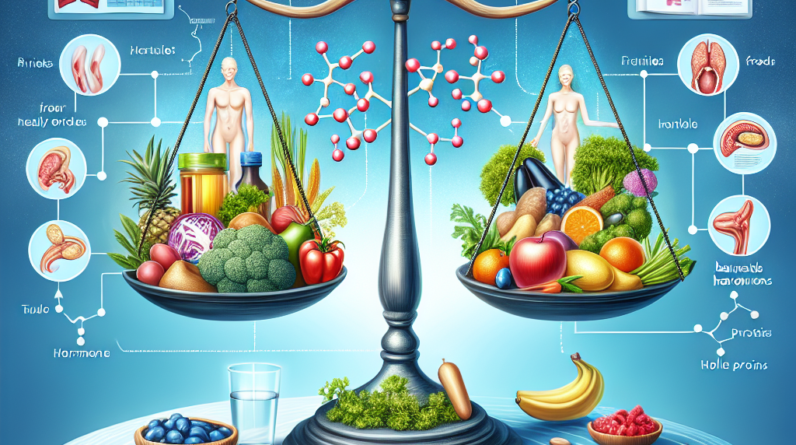
Eating Whole Foods
Understanding Whole Foods
So, first things first, let’s chat about whole foods. In my experience, these are basically the superheroes of the food world. Whole foods are items that are as close to their natural state as possible—think fruits, vegetables, nuts, and whole grains. I mean, can you remember the last time you felt amazing after munching on a bag of chips? Exactly! They can’t hold a candle to the energy I’d get from a bright apple or a handful of almonds.
Get a Huge Discount and Bonus! Try for 90 Days Risk Free
It’s crazy how our bodies respond to what we eat. Whole foods are packed with nutrients, helping to stabilize blood sugar and keep those hormones in check. I’ve noticed that after a week of focusing on whole foods, my mood swings and energy level improved massively. It’s like flipping a switch!
Another bonus? When you focus on whole foods, you’re naturally eliminating a lot of processed junk. And trust me, those processed items are notorious for messing with your hormones, leading to all sorts of chaos. By opting for the real deal, you’re doing your body a huge favor.
Practical Tips for Incorporating Whole Foods
Now, let’s get practical. I’ve learned that it’s all about making small, doable changes to your diet. One thing I do is keep my fridge stocked with fresh produce. I tend to spend a little time each week prepping my veggies—washing and chopping them can save a lot of time during the busy days.
I also found that planning meals around whole foods helps. Rather than fixing my meals around processed options, I think, “What whole foods do I want to enjoy this week?” It flips the script completely and keeps things fresh and exciting.
Don’t forget to experiment! It’s super fun to try new recipes or techniques for cooking whole foods. I recently discovered how to roast Brussels sprouts, and now they’re my go-to side dish. Yum!
Mindfulness with Whole Foods
Let’s chat about being mindful with our eating habits. I’ve realized that slowing down and appreciating what I eat helps maintain a balanced diet. Taking my time to truly savor a meal filled with whole foods makes it so much more enjoyable.
Some days, I even sit down without distractions. No phones, no TV—just me and my food. It’s a bit of a game changer. I notice how I feel before, during, and after the meal, which lets me listen to my body. This practice alone has helped me regulate my appetite and steer clear of cravings for unhealthy snacks.
Plus, when I enjoy my food, I’m way more likely to stick to a pattern of eating that supports both my hormones and overall health. It feels good to reconnect with my food!
Get a Huge Discount and Bonus! Try for 90 Days Risk Free
Healthy Fats are Your Friends
Your Hormones Need Fats
Alright, let’s talk about fats! I’ve had my doubts, too, but healthy fats—think avocados, nuts, and olive oil—are essential for hormone production. Believe me, cutting out all fats is not a wise move if you want hormone balance!
Incorporating healthy fats into my meals has been a game changer. I started adding a bit of avocado on my toast or mixing nuts into my salads for that extra crunch. Not only does it taste great, but my skin has cleared up, and my energy levels feel way more stable throughout the day.
Additionally, healthy fats can help reduce inflammation and support your brain health. Really, it’s a win-win! I used to worry about fat content in my meals, but now I focus on making sure I include good fats instead.
Simple Ways to Add Healthy Fats
So, how can you nod your head along with this concept? One of my favorite tricks is to replace butter with olive oil in cooking. It adds a lovely flavor to my dishes and packs that healthy fat punch.
Need a Serious Energy BOOST? Huge Discount Try for 90 Days Risk Free
You might also want to check out some delicious nut butters. Spreading almond or peanut butter on toast is an easy heaven on earth! Full of flavor and good for hormones—what’s not to like?
And let’s not forget seeds! I sprinkle chia or flaxseeds on my smoothies or yogurt. It’s subtle but boosts my nutrient intake and keeps everything ticking along smoothly.
How to Choose the Right Fats
Choosing the right fats can be tricky. I’ve learned to read labels and avoid trans fats like the plague. If it sounds too complicated, then it probably isn’t a good option for you. Simple is better!
Focus on those whole, unprocessed options. Instead of wondering how much fat is in something, ask yourself how many good ingredients you can count. If it’s fewer than three, I usually pass.
Lastly, just remember: balance is key! Enjoy those healthy fats, but don’t go overboard because moderation matters too. Trust me; I’ve been there, and feeling sluggish isn’t worth it!
Incorporating Protein Wisely
Selecting Quality Protein Sources
Let’s dig into protein! I’ve noticed that choosing quality protein sources really impacts my hormone balance. Opting for plant-based proteins like lentils and chickpeas or even responsibly-raised animal proteins can do wonders!
For me, choosing these better options has made meals tastier, too. Ever tried a spicy chickpea salad? Mind-blowing! Not only are you nourishing your body, but it’s fun to explore different dishes.
By focusing on high-quality proteins, I’ve seen improvements in energy levels, muscle tone, and even satiety. It’s all about fueling our bodies with what they truly deserve.
Good Health Solution is Easier Than Most People Think!
Take a Look for Yourself!
How Much Protein is Enough?
Finding the right amount of protein can be a bit of a balancing act. I used to stress about numbers, but instead, I focus on including protein in every meal. It could be a few beans in my quinoa, some eggs in my breakfast, or a scoop of protein powder in my smoothie.
A great rule of thumb I’ve picked up is to fill half my plate with veggies and include a palm-sized portion of protein. This visual cue is super easy to keep in mind!
Just pay attention to how your body feels. If you find yourself getting hungry too soon after meals, you might want to increase your protein a tad. Listening to your body can lead to some fantastic discoveries.
Balancing Proteins with Other Nutrients
One thing I love is the combination of protein with other nutrients. For instance, adding some healthy fats to a protein source can make meals more filling and satisfying. I often throw some avocado on my protein-rich salads, and it’s a winner!
Additionally, pairing protein with carbs can help regulate insulin levels, which is super important for hormone balance. Sweet potatoes and black beans together? Heaven!
The adventure of new flavors and textures when pairing proteins with various foods always makes cooking exciting for me. You’ll become a star chef in your kitchen before you know it!
Staying Hydrated
The Importance of Water
Alright, let’s wrap this up with hydration, one of the simplest yet often overlooked steps. Water is essential for every function in our bodies, including hormone signaling. I’ve noticed that on days I’m properly hydrated, my energy and mood levels soar!
Staying hydrated also aids digestion. When I don’t drink enough, it’s like my body hits the brakes, leading to hormonal imbalances. So, it’s vital to keep sipping throughout the day!
I’ve found that carrying a water bottle around keeps me accountable. It reminds me to drink up and keep my body happy and functioning at its best.
How to Get Enough Fluids Daily
To boost my fluid intake, I’ve started infusing my water with fruits like lemon or cucumber. This little twist makes it so much more enjoyable! Even herbal teas count and provide additional health benefits.
Remember, it doesn’t have to be just plain water. I’ve discovered smoothies and soups are great ways to embrace hydration, too—plus they can pack a nutrient punch!
Set reminders on your phone if you’re likely to forget. It’s surprising how easy it is to skip hydration while getting carried away with the day-to-day hustle.
Listening to Your Body
Finally, I can’t stress enough the need to listen to your body’s cues. If you’re feeling sluggish, it could indicate dehydration. I’ve spent too many afternoons dragging myself around just because I neglected what my body was trying to tell me! So paying attention makes all the difference.
Sometimes, my body craves water just as much it craves food. It’s a learning process, but sticking to a mindful approach really helps me maintain that sense of balance.
Trust your instincts and treat that thirst as a signal to hydrate. You’d be amazed at how much better you’ll feel, and your hormones will thank you for it!
Frequently Asked Questions
1. Can diet really affect hormones?
Absolutely! What you eat plays a huge role in balancing your hormones. Whole foods, healthy fats, and quality proteins can significantly impact hormone production and regulation.
2. Are there specific foods that can help balance hormones?
Definitely! Foods rich in omega-3 fatty acids, like fish and flaxseeds, along with leafy greens, nuts, and whole grains can be beneficial. These foods help reduce inflammation and regulate hormone levels.
3. How much water should I drink daily?
While there’s no one-size-fits-all answer, a common guideline is about 8 cups (64 ounces), but listen to your body! If you’re active or it’s hot outside, you’ll likely need more.
4. Can stress impact my hormone balance?
For sure! Stress can lead to the production of cortisol, which negatively impacts other hormones. Managing stress is crucial for maintaining balance, so take time for relaxation and self-care.
5. Are there any foods to avoid when trying to balance hormones?
Yes, you’ll want to steer clear of refined sugars, processed foods, and trans fats. These can wreak havoc on your hormones and lead to imbalances, making it harder to maintain good health.








